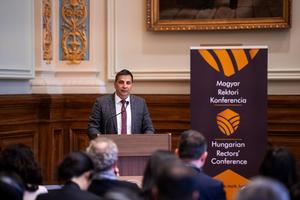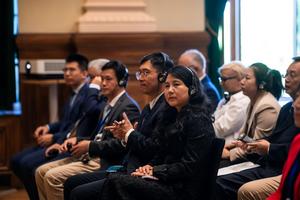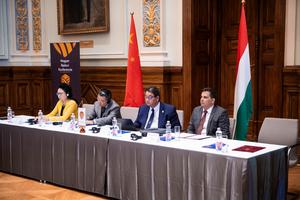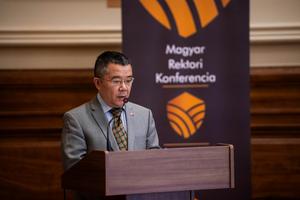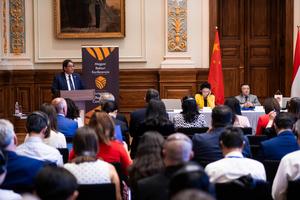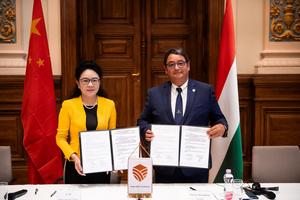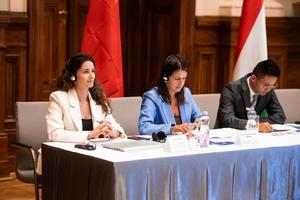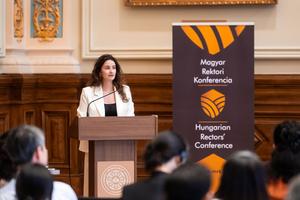The “Hungary–China Rectors’ Dialogue” was held on September 23 in the ceremonial Széchenyi Hall of the Ludovika University of Public Service (LUPS). The aim of the event was to further deepen Hungarian–Chinese higher education relations, providing a forum for academic dialogue and encouraging the development of student and faculty mobility.
In his opening remarks, Gong Tao, China’s Ambassador to Hungary, emphasized that Hungary and China are long-standing friends whose relationship is characterized by a persistent strategic partnership. He highlighted that currently twelve Hungarian universities are engaged in nearly thirty joint projects with Chinese institutions—for example, the University of Szeged in electronic technologies, and the University of Debrecen and the Hungarian University of Agriculture and Life Sciences in R&D programs. He also noted that several Confucius Institutes are active in Hungary, with Chinese language majors now offered at two universities. In addition, several major Chinese companies (e.g., Bank of China, Huawei) support Hungarian higher education—Huawei, for instance, sponsors the Liszt Ferenc Academy of Music.
Béla Merkely, President of the Hungarian Rectors’ Conference (HRC) and Rector of Semmelweis University, spoke about Hungary’s six-hundred-year-old university tradition. He stressed that universities have always operated in the spirit of openness and renewal. He explained that the aim of the event was to strengthen mobility and cooperation, and to build bridges based on mutual respect and friendship. He added that addressing global challenges jointly in higher education is a key issue.
Fu Bo, Deputy Secretary General of the China Education Association for International Exchange (CEAIE), underlined that China and Hungary have long been reliable partners. He pointed out that more than 3,000 Chinese students are currently studying in Hungary. His proposals included creating a joint scientific platform (particularly in biomedical and agricultural sciences), supporting talent search and development, and ensuring faster transfer of academic research results into practice. “We can be a model for successful cooperation between Eastern and Western nations,” he added.
“The task of universities is to build bridges between two states,” stressed Gergely Deli, Rector of Ludovika University of Public Service (LUPS) and Chair of the State Section of the Hungarian Rectors’ Conference (HRC), in his welcome address. He explained that LUPS is one of the key knowledge centers in the region, with active ties to China. He recalled leading a delegation to China in July, where he met with leaders of several prominent universities (including Peking University). He underlined that Chinese partners highly valued LUPS’s initiatives. He also spoke about future goals, including expanding cooperation to cover exchange programs, strategic dialogues, and joint conferences. He added that the purpose of the conference was to achieve tangible results in the form of joint programs, institutional partnerships, and personal relationships.
The opening featured a formal signing ceremony between Li Huining, Director of CEAIE’s Vocational Education Cooperation Program, and Béla Merkely. The agreement aims to strengthen institutionalized cooperation between the two parties, promoting the expansion of higher education relations and the implementation of joint programs.
The day continued with panel discussions. In the panel titled Accelerating Innovation and Joint Talent Development—focused on connecting joint research resources more effectively and supporting shared talent development—Liliana Śmiech, Director General for International Affairs at LUPS, represented the university. She presented details of the university’s partnerships, particularly with Chinese institutions, and emphasized the importance of innovation, including opportunities offered by artificial intelligence and the green transition, while also stressing the need to prepare for the challenges of the digital era. She outlined the university’s mission of training professionals for public service and preparing for a sustainable future, and pointed to the historical foundations of Hungarian–Chinese relations. She also discussed current cooperation initiatives, such as hosting visiting Chinese professors and building ties with prestigious institutions. She highlighted the cooperation agreement between LUPS and the International Research Center on Big Data for Sustainable Development Goals (CBAS-IRCS), linked to the Chinese Academy of Sciences (CAS), which focuses on joint research in early flash flood forecasting. She also outlined the next steps, including launching joint research in sustainable development and flood forecasting, nurturing and expanding existing Chinese ties, and organizing major international scientific events to strengthen professional dialogue.
Throughout the day, participants also addressed topics such as strengthening cooperation in engineering and technology through international academic networks, fostering cultural understanding and mutual learning, opportunities and challenges in promoting two-way student and faculty mobility, and research collaborations between Hungary and China in mutually prioritized fields.
Text: Éva Harangozó
Photo: Dénes Szilágyi
